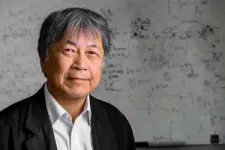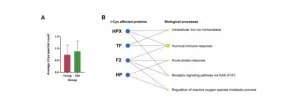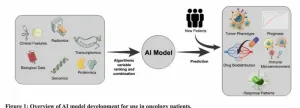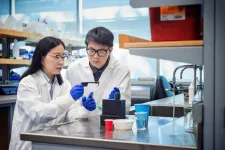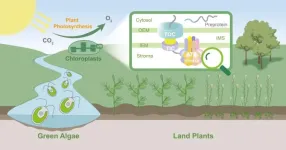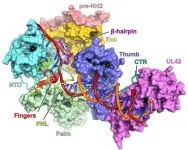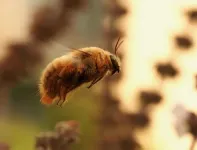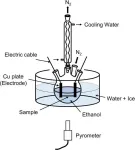(Press-News.org) UCLA has received a $120 million commitment from surgeon, inventor and philanthropist Dr. Gary Michelson and his wife, Alya, to kick-start the California Institute for Immunology and Immunotherapy, an innovative public-private partnership aimed at spurring breakthrough discoveries that prevent and cure diseases and catalyze economic growth and innovation in Los Angeles.
Michelson, a spine surgeon and prolific inventor who holds nearly 1,000 individual patents, is co-founder and chair of the board of the institute, which will be housed at UCLA’s state-of-the-art research park.
The gift, distributed via the Michelson Medical Research Foundation, designates $100 million to establish two research entities within the institute, each funded by $50 million; one will focus on rapid vaccine development and the other on harnessing the microbiome to advance human health. The microbiome research will be conducted in collaboration with the new UCLA Goodman-Luskin Microbiome Center, placing it among the largest microbiome research enterprises in the world.
In addition, the foundation, a part of the Michelson Philanthropies network of foundations co-chaired by the Michelsons, is funding a $20 million endowment to provide research grants to young scientists using novel processes to advance immunotherapy research, human immunology and vaccine discovery.
“The UCLA community owes Alya and Gary Michelson a debt of gratitude for this transformative gift,” said UCLA Interim Chancellor Darnell Hunt. “The Michelsons envisioned an institute that would leverage UCLA’s strengths for maximum public good, create new knowledge leading to better medical treatments, and reshape the study of immunology. The gift will change countless lives here and across the globe.”
“Immunology is the mediator of nearly all human diseases, whether we’re talking about cancer or heart disease or Alzheimer’s,” Michelson said. “The vision for this institute is to become a ‘field of dreams’ — the world’s leading center for the study of the immune system to develop advanced immunotherapies to prevent, treat and cure all of the diseases that afflict people today and to end these diseases in our lifetime.
“Scientific research is the key to making possible longer and healthier lives,” he added. “That’s the reason why Alya and I are making this philanthropic investment. There is no place that we could make an investment that will have a more profound effect on so many. We are deeply grateful to former UCLA Chancellor Gene Block for his steadfast leadership; Interim Chancellor Darnell Hunt for his continued partnership; UCLA Health’s Dr. John Mazziotta for his dedication and hard work; Gov. Gavin Newsom, former Assembly Speaker Anthony Rendon and former Senate President Pro Tempore Toni Atkins for their visionary confidence; the UC Board of Regents; and my fellow founders for their unwavering support of this ambitious endeavor to build the premier institute for scientific research and innovation.”
The institute was co-founded by Meyer Luskin, Dr. Eric Esrailian, Dr. Arie Belldegrun, Michael Milken and Sean Parker. At 360,000 square feet, it will be the primary occupant in the 700,000-square-foot UCLA Research Park that is on the site of the former Westside Pavilion. UCLA’s January 2024 acquisition of the property, 2 miles from the Westwood campus, was made possible in part by a $200 million appropriation from the state of California.
Former UCLA Chancellor Gene Block, who stepped down on July 31 after 17 years leading the university, played a central role in coordinating the acquisition of the Westside Pavilion property and the effort to bring the California Institute for Immunology and Immunotherapy to UCLA.
“I am incredibly excited to see the institute taking shape — in large part due to the work and contributions of the Michelsons and our other partners — and I believe as strongly as ever that UCLA and Los Angeles will be the perfect home for it,” said Block. “The institute exemplifies UCLA’s enduring commitment to harnessing scientific research for the public good, and it will cement our university’s position as one of the world’s leading centers of medical innovation.”
“The California Institute for Immunology and Immunotherapy at UCLA’s Research Park is yet another proof point that California remains the epicenter of global innovation – an endeavor that will benefit California, the United States, and the world,” said California Gov. Gavin Newsom. “This incredible act of generosity by Alya and Gary Michelson, coupled with Gary’s prolific work over the years as a leading innovator in the medical field, perfectly exemplifies the California spirit and will help ensure our state’s global economic, scientific, and technological dominance for decades to come.”
“The launch of the California Institute for Immunology and Immunotherapy showcases what’s possible with collaboration,” said Los Angeles Mayor Karen Bass. “Locking arms to make investments like this opens the possibility for groundbreaking research that has the potential to fundamentally change health outcomes around the world and create good jobs in Los Angeles. I want to thank Dr. Gary Michelson and Alya Michelson for taking this action, which will positively impact Angelenos and people worldwide for decades.”
The institute will operate as a nonprofit, 501(c)(3) medical research organization governed by an independent board that includes UCLA representatives. The recipient of the $120 million gift from the Michelsons is the David Geffen School of Medicine at UCLA, which will use the funding to support research at the institute.
The institute leverages an unprecedented blend of public investment, philanthropic funding, and UCLA’s strengths in clinical treatment and scientific research. It is designed to be an agile, interdisciplinary, highly collaborative network of research facilities that, in concert with private industry, will accelerate the development and delivery of new pharmaceuticals and treatments for patients.
The institute will recruit leading scientists from around the world, create an integrated ecosystem of biotechnology startups and train the next generation of leading-edge medical researchers. As a hub of biomedical collaboration, the institute and the biomedical companies it gives rise to will be an economic engine for the region and state.
“I am grateful to Alya and Gary and their fellow co-founders. Their vision for and support of the institute is a vote of confidence in our ability to cure some of the most devastating disorders — together,” said Dr. John Mazziotta, UCLA’s vice chancellor for health sciences and CEO of UCLA Health.
This gift is the Michelsons’ single largest donation over more than 30 years of philanthropy. The couple has contributed hundreds of millions of dollars to fighting social inequities and supporting medical research, education reform, prison reform and animal welfare. Among other projects, they fund the annual Michelson Prizes for immunology and vaccine research.
In 2016, the Michelsons signed The Giving Pledge, a campaign launched by Bill Gates and Warren Buffett that encourages the wealthiest individuals and families to contribute the majority of their fortune to philanthropic causes.
END
UCLA receives $120 million from Alya and Gary Michelson for new California Institute for Immunology and Immunotherapy
Transformative donation will spur breakthrough discoveries and drive economic growth for the region
2024-08-27
ELSE PRESS RELEASES FROM THIS DATE:
Dunick receives funding for Center For Economic Education
2024-08-27
Dunick Receives Funding For Center For Economic Education
Jason Dunick, Associate Chair and Term Associate Professor, Economics, College of Humanities and Social Sciences (CHSS), received $108,692 from Virginia Council on Economic Education for: “Center for Economic Education.”
Dunick will use this funding to support the continuation of the services of the Center for Economic Education. The Center supports K-12 teachers who are teaching economics and personal finance in Virginia.
This grant represents the renewal of a long-standing relationship with the ...
National Institutes of Health awards $2.4 million grant to cross-disciplinary team of researchers to study psychedelics for methamphetamine addiction
2024-08-27
FOR IMMEDIATE RELEASE
Media Contacts:
Colleen McDonald
Sr. Consultant, Earned Media
Kara Reed
Director of Development
Lisa Babin
Executive Director of Communications
Medical College of Wisconsin
University of California San Diego
LSU Health Shreveport
414.801.3146 | cmcdonald@mcw.edu
217.390.6629 | k3hendrickson@ucsd.edu
318.675.8769 | lisa.babin@lsuhs.edu
Milwaukee, Wis., August 27, 2024 – John McCorvy, PhD, Assistant Professor in the Department ...
Trioxidized cysteine and aging: Beyond proteinopathic paradigms
2024-08-27
“The results indicated a significant increase in cumulative t-Cys levels and the total number of t-Cys residues in aging and aged mice proteomes compared to young groups.”
BUFFALO, NY- August 27, 2024 – A new research perspective was published in Aging (listed by MEDLINE/PubMed as "Aging (Albany NY)" and "Aging-US" by Web of Science), Volume 16, Issue 15 on July 25, 2024, entitled, “Trioxidized cysteine and aging: a molecular binomial that extends far beyond classical proteinopathic paradigms.”
Oxidative stress (OS) - characterized by an imbalance between oxidants and antioxidants - leads to the formation ...
Artificial intelligence: Revolutionizing precision oncology
2024-08-27
“Properly leveraged AI-based techniques could herald a new era of precision medicine guided by non-invasive, imaging-based disease evaluation."
BUFFALO, NY- August 27, 2024 – A new editorial was published in Oncotarget's Volume 15 on August 26, 2024, entitled, “Artificial intelligence: A transformative tool in precision oncology.”
Artificial intelligence (AI) is revolutionizing society and healthcare, opening new possibilities for precision medicine. In oncology, immunotherapy (IO) has similarly transformed cancer treatment with novel ...
How much microplastic are you drinking? New UBC tool can tell you in minutes
2024-08-27
Micro- and nanoplastics are in our food, water and the air we breathe. They are showing up in our bodies, from testicles to brain matter.
Now, University of British Columbia researchers have developed a low-cost, portable tool to accurately measure plastic released from everyday sources like disposable cups and water bottles.
The device, paired with an app, uses fluorescent labeling to detect plastic particles ranging from 50 nanometres to 10 microns in size – too small to be detected by the naked eye – and delivers results in minutes.
The method and findings are detailed in ACS Sensors.
“The breakdown of larger plastic pieces into microplastics ...
Race and ethnicity and diagnostic testing for common conditions in the acute care setting
2024-08-27
About The Study: White patients discharged from the emergency department with a nonspecific diagnosis of interest were significantly more likely than Black patients to receive related diagnostic testing in this study. The extent to which this represents diagnostic test overuse in white patients vs undertesting and missed diagnoses in Black patients deserves further study.
Corresponding Author: To contact the corresponding author, Michael I. Ellenbogen, M.D., email mellenb6@jhmi.edu.
To access the embargoed study: Visit our For The Media website at this link https://media.jamanetwork.com/
(doi:10.1001/jamanetworkopen.2024.30306)
Editor’s ...
Groundbreaking studies provide key insights into chloroplasts protein import motor
2024-08-27
Two groundbreaking studies published in the journal Cell shed light on the assembly, function and evolutionary diversity of the chloroplast protein import system.
Chloroplasts are fundamental organelles in plant cells that act as the primary site of photosynthesis to sustain life on Earth. Although chloroplasts have their own genome, most of their proteins are encoded in the nucleus and synthesized as preproteins in the cytosol. These preproteins are subsequently transported across the outer and inner envelope membranes of the chloroplasts. The translocon machineries, known as the TOC (translocon at the outer chloroplast membrane) and TIC (translocon at ...
What enables herpes simplex virus to become impervious to drugs?
2024-08-27
All organisms — from fungi to mammals — have the capacity to evolve and adapt to their environments. But viruses are master shapeshifters with an ability to mutate greater than any other organism. As a result, they can evade treatments or acquire resistance to once-effective antiviral medications.
Working with herpes simplex virus (HSV), a new study led by Harvard Medical School researchers sheds light on one of the ways in which the virus becomes resistant to treatment, a problem that could be particularly ...
Keeping native bees buzzing requires rethinking pest control
2024-08-27
Whether you’re strolling through a garden, wandering a park, or simply enjoying an open space in the United States, you’re likely to notice bees buzzing about the flowers. While honeybees, imported from Europe in the 17th century to produce honey, are the most recognizable, they aren’t the only bees at work. If you’re a keen observer, you might spot some of the thousands of less familiar, native bee species that call these spaces home.
Native wild bees play a crucial ecological role, ensuring the survival and reproduction of ...
Nanotubes get a boost: Liquid-phase synthesis unlock efficient production
2024-08-27
Single-walled carbon nanotubes (SWCNTs) are known for their remarkable properties, which make them essential in many advanced technologies. Yet, creating these nanotubes efficiently and on a large scale has been a persistent challenge.
Now, a team led by Professor Takahiro Maruyama at Meijo University has introduced a revolutionary method that utilizes cobalt (Co) and iridium (Ir) nanoparticle catalysts in a liquid-phase synthesis process. This innovative approach offers a promising solution to the longstanding issues of production efficiency and scalability. These findings have been published ...
LAST 30 PRESS RELEASES:
More time spent on social media linked to steroid use intentions among boys and men
New study suggests a “kick it while it’s down” approach to cancer treatment could improve cure rates
Milken Institute, Ann Theodore Foundation launch new grant to support clinical trial for potential sarcoidosis treatment
New strategies boost effectiveness of CAR-NK therapy against cancer
Study: Adolescent cannabis use linked to doubling risk of psychotic and bipolar disorders
Invisible harms: drug-related deaths spike after hurricanes and tropical storms
Adolescent cannabis use and risk of psychotic, bipolar, depressive, and anxiety disorders
Anxiety, depression, and care barriers in adults with intellectual and developmental disabilities
Study: Anxiety, gloom often accompany intellectual deficits
Massage Therapy Foundation awards $300,000 research grant to the University of Denver
Gastrointestinal toxicity linked to targeted cancer therapies in the United States
Countdown to the Bial Award in Biomedicine 2025
Blood marker from dementia research could help track aging across the animal world
Birds change altitude to survive epic journeys across deserts and seas
Here's why you need a backup for the map on your phone
ACS Central Science | Researchers from Insilico Medicine and Lilly publish foundational vision for fully autonomous “Prompt-to-Drug” pharmaceutical R&D
Increasing the number of coronary interventions in patients with acute myocardial infarction does not appear to reduce death rates
Tackling uplift resistance in tall infrastructures sustainably
Novel wireless origami-inspired smart cushioning device for safer logistics
Hidden genetic mismatch, which triples the risk of a life-threatening immune attack after cord blood transplantation
Physical function is a crucial predictor of survival after heart failure
Striking genomic architecture discovered in embryonic reproductive cells before they start developing into sperm and eggs
Screening improves early detection of colorectal cancer
New data on spontaneous coronary artery dissection (SCAD) – a common cause of heart attacks in younger women
How root growth is stimulated by nitrate: Researchers decipher signalling chain
Scientists reveal our best- and worst-case scenarios for a warming Antarctica
Cleaner fish show intelligence typical of mammals
AABNet and partners launch landmark guide on the conservation of African livestock genetic resources and sustainable breeding strategies
Produce hydrogen and oxygen simultaneously from a single atom! Achieve carbon neutrality with an 'All-in-one' single-atom water electrolysis catalyst
Sleep loss linked to higher atrial fibrillation risk in working-age adults
[Press-News.org] UCLA receives $120 million from Alya and Gary Michelson for new California Institute for Immunology and ImmunotherapyTransformative donation will spur breakthrough discoveries and drive economic growth for the region

